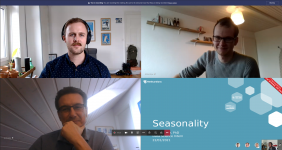Externship within NetGuardians
Dr. Miles Timpe is a postdoctoral researcher in computational astrophysics at the University of Zurich’s Institute for Computational Science. His research is focused on the formation of Earth-like planets and their moons. His broader interests lie in the applications of AI/ML in the space sciences and physics-aware ML algorithms.
NetGuardians is an award-winning fintech company based in Yverdon that develops solutions to help financial institutions in over 30 countries to fight fraud. The core business of NetGuardians is banking fraud: monitoring the behaviour of the customers of a banking institution allow to detect unusual behaviour – resulting for example from thehijack of a user’s e-banking session – and prevent fraud before the money leaves the bank.
These two worlds are not as far apart as they seem. In Spring 2020, NetGuardians proposed a research project based on Seasonality analysis to the Knowledge Transfer Platform of PlanetS. It took Miles only a few days to establish first contact. “During the six years that I’ve been a member of the NCCR PlanetS consortium, I’ve kept a close eye on the internship opportunities offered through the Technology Platform’s Knowledge Transfer program. In the past, these opportunities have generally been focused on areas outside of my expertise, such as optics, but when the opportunity to work with NetGuardians presented itself, I was intrigued. NetGuardians is a young and dynamic Swiss company tackling a challenging problem in the financial sector. Banking fraud detection is a fascinating problem to work on and I’ve been happy to have the opportunity learn from the best.”
Despite the complex Covid-19 situation, both parties were eager to move forward with the project. An agreement was reached for a three-month externship, starting mid-october 2020.
“The externships offered through the Technology Platform’s Knowledge Transfer program are excellent opportunities for PhD students and postdocs”, says Miles. “Only a small percentage of us will remain in academia for the long run. Therefore, such opportunities are invaluable and virtually required in the move from academic to industry. Moreover, for those of us in NCCR PlanetS who are non-Swiss, non-EU/EFTA nations, these are generally the only internships in Switzerland that we are eligible for.”
The analytical core of the NetGuardians solution relies on an accurate modelling of the current and future behaviour of bank customers, using only fragmented information coming from their past behaviour. A key aspect currently researched by the NetGuardians R&D team revolves around the impact of recurrence in the data. Miles’ externship research project has been part of this effort. During his three months working at NetGuardians, Miles quantified how the completeness of historical data affects the quality of the predicted behaviour of the customers. He also developed a pipeline to identify the temporal trends and seasonality aspects present in the data and started an ongoing effort to correct from such effects to improve the prediction accuracy.
Miles’ externship was supervised by Dr. Vivien Bonvin, a former EPFL researcher now Data Scientist at NetGuardians. “I spent six years doing research in observational cosmology before moving towards applied AI. I know from first-hand experience what a researcher from academia is capable of. I heard from the PlanetS Knowledge Transfer initiative from colleagues I had during my time at the Geneva Observatory. Such initiatives are keys in my opinion to give academics a glimpse of what working in the industry looks like, and to give companies a display of how useful and efficient academics can be. Since most researchers are going eventually to move to the industry, it is essential to build bridges so that both worlds can understand each other better. With NetGuardians’ ambition to propose cutting-edge analytics to its customer, there is always plenty of research topics to explore and the KT initiative was a perfect opportunity in that regard.”
Miles brought with him his advanced analytical knowledge and experience in time-series analysis. He developed tools and pipelines that contains advanced statistics, but also make sure to properly detail his though process for future developers to understand the core idea and goals – no black magic involved here.
In addition to his analytical skills, Miles also had a strong computational background which allowed him to be immediately at ease within the NetGuardians R&D framework. The technical implementation of Miles’ ideas was directly done inside the proprietary research library developed at NetGuardians, which ensures a high reusability for future projects. Thanks to that, in addition to bringing direct answers to questions NetGuardians had, Miles’ externship is a stepping stone for future research project.
“Even though we saw each other face-to-face for only two days in total, it has been great fun to work together”, says Vivien. “Miles adapted to his new working environment very rapidly and was useful from day one.” A feeling shared by Miles: “The data science team at NetGuardians was welcoming, good humored, and easy to get along with. I enjoyed immensely my time, even if only three months, with them. By a lucky coincidence, my direct advisor at NetGuardians, Vivien, was also an astrophysicist, so we spoke the same language!”

Although we would have loved to welcome Miles in our offices at Yverdon, we opted for the reasonable option and worked from home as much as possible. So instead of a nice illustrative picture, here is a screenshot of Miles ready to start his closing presentation via Teams, with (at least) two NetGuardians’ employees smiling in anticipation.

